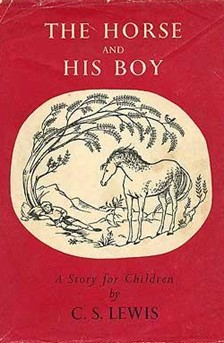
The Chronicles of Narnia are among my favorite fiction because they teach us so much about the Christian life. In the series, I like The Horse and His Boy the best. In that book, the main protagonist, an orphan named Shasta, flees Calormen seeking to save himself, his friends, and Archenland, where, unbeknownst to him, his father is king. This part comes as he has just finished racing across the desert and from a giant lion:
"Are--are--are you," panted Shasta. "Are you King Lune of Archenland?" The old man shook his head, "No," he replied in a quiet voice, "I am the Hermit of the Southern March. And now, my son, waste no time on questions, but obey. This damsel is wounded. Your horses are spent. Rabadash is at this moment finding a ford over the Winding Arrow. If you run now, without a moment's rest, you will still be in time to warn King Lune. "Shasta's heart fainted at these words for he felt he had no strength left. And he writhed inside at what seemed the cruelty and unfairness of the demand. He had not yet learned that if you do one good deed your reward usually is to be set to do another and harder and better one. But all he said aloud was:"Where is the King?" The Hermit turned and pointed with his staff. "Look," he said. "There is another gate, right opposite to the one you entered by. Open it and go straight ahead: always straight ahead, over level or steep, over smooth or rough, over dry or wet. I know by my art that you will find King Lune straight ahead. But run, run: always run."I ran cross-country in school and enjoy climbing for the reason that both activities require endurance, both physical but mental. I remember being roped up, about 500 vertical feet from the lip of Mt. Rainier's crater, when one woman in our group decided to turn around. Of course, she felt bad afterward for not enduring and no one could blame her, but what a pity! In the Christian life, we need endurance. We may have times of respite, but for the most part, we're running for the finish line. Our race will not end until we reach the goal for which our Lord Jesus has called us heavenward.
"Suppose one of you had a servant plowing or looking after the sheep. Would he say to the servant when he comes in from the field, 'Come along now and sit down and eat'? Would he not rather say, 'Prepare my supper, get yourself ready and wait on me while I eat and drink; after that you may eat and drink'? Would he thank the servant because he did what he was told to do? So you also, when you have done everything you were told to do, should say, 'We are unworthy servants; we have only done our duty.'"In Luke 17:7-10, Jesus explains the duty that Christians have as servants of God. We cannot congratulate ourselves for running the race in obedience to Him--we are only doing our duty. Yes, Jesus came as a servant, but that only makes our servanthood more imperative. "No student is above his master," and if Jesus was obedient and ran the race well, we should strive all the more to be like Him. In Luke 17, Jesus noted that the usual reward for a good deed is to be assigned another harder, better one. Only after we have done everything should we expect to rest. In the meantime, we are unworthy servants who are only doing their duty.
No comments:
Post a Comment